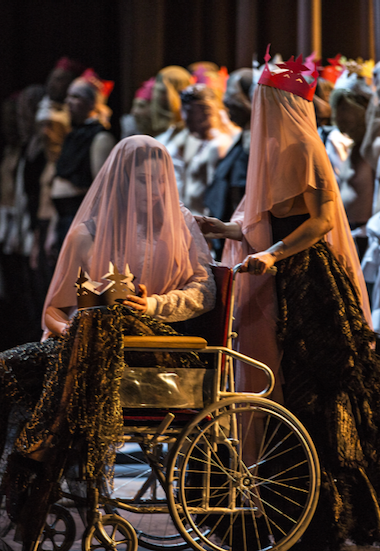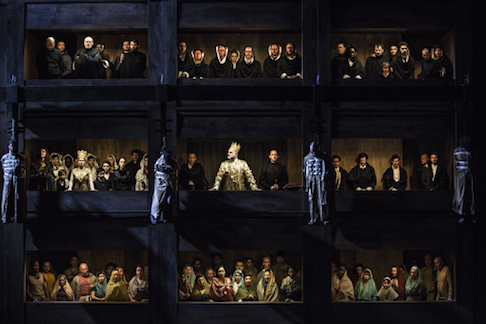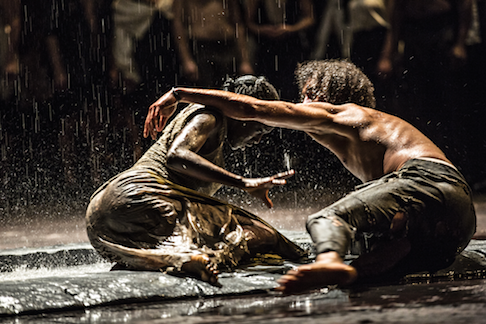
23 Mar 2018
Don Carlos in Lyon
Metteur en scène Christophe Honoré placed his 2016 Aix Festival Cosi fan tutte in Ethiopia. Unfortunately his current Lyon Don Carlos enjoys no such equivalent poetic intuition.
English Touring Opera are delighted to announce a season of lyric monodramas to tour nationally from October to December. The season features music for solo singer and piano by Argento, Britten, Tippett and Shostakovich with a bold and inventive approach to making opera during social distancing.
This tenth of ten Live from London concerts was in fact a recorded live performance from California. It was no less enjoyable for that, and it was also uplifting to learn that this wasn’t in fact the ‘last’ LfL event that we will be able to enjoy, courtesy of VOCES8 and their fellow vocal ensembles (more below …).
Ever since Wigmore Hall announced their superb series of autumn concerts, all streamed live and available free of charge, I’d been looking forward to this song recital by Ian Bostridge and Imogen Cooper.
The Sixteen continues its exploration of Henry Purcell’s Welcome Songs for Charles II. As with Robert King’s pioneering Purcell series begun over thirty years ago for Hyperion, Harry Christophers is recording two Welcome Songs per disc.
Although Stile Antico’s programme article for their Live from London recital introduced their selection from the many treasures of the English Renaissance in the context of the theological debates and upheavals of the Tudor and Elizabethan years, their performance was more evocative of private chamber music than of public liturgy.
In February this year, Albanian soprano Ermonela Jaho made a highly lauded debut recital at Wigmore Hall - a concert which both celebrated Opera Rara’s 50th anniversary and honoured the career of the Italian soprano Rosina Storchio (1872-1945), the star of verismo who created the title roles in Leoncavallo’s La bohème and Zazà, Mascagni’s Lodoletta and Puccini’s Madama Butterfly.
Evidently, face masks don’t stifle appreciative “Bravo!”s. And, reducing audience numbers doesn’t lower the volume of such acclamations. For, the audience at Wigmore Hall gave soprano Elizabeth Llewellyn and pianist Simon Lepper a greatly deserved warm reception and hearty response following this lunchtime recital of late-Romantic song.
Collapsology. Or, perhaps we should use the French word ‘Collapsologie’ because this is a transdisciplinary idea pretty much advocated by a series of French theorists - and apparently, mostly French theorists. It in essence focuses on the imminent collapse of modern society and all its layers - a series of escalating crises on a global scale: environmental, economic, geopolitical, governmental; the list is extensive.
For this week’s Live from London vocal recital we moved from the home of VOCES8, St Anne and St Agnes in the City of London, to Kings Place, where The Sixteen - who have been associate artists at the venue for some time - presented a programme of music and words bound together by the theme of ‘reflection’.
'Such is your divine Disposation that both you excellently understand, and royally entertaine the Exercise of Musicke.’
Amongst an avalanche of new Mahler recordings appearing at the moment (Das Lied von der Erde seems to be the most favoured, with three) this 1991 Mahler Second from the 2nd Kassel MahlerFest is one of the more interesting releases.
‘And there was war in heaven: Michael and his angels fought against the dragon; and the dragon fought and his angels, And prevailed not; neither was their place found any more in heaven … that old serpent … Satan, which deceiveth the whole world: he was cast out into the earth, and his angels were cast out with him.’
If there is one myth, it seems believed by some people today, that probably needs shattering it is that post-war recordings or performances of Wagner operas were always of exceptional quality. This 1949 Hamburg Tristan und Isolde is one of those recordings - though quite who is to blame for its many problems takes quite some unearthing.
There was never any doubt that the fifth of the twelve Met Stars Live in Concert broadcasts was going to be a palpably intense and vivid event, as well as a musically stunning and theatrically enervating experience.
‘Love’ was the theme for this Live from London performance by Apollo5. Given the complexity and diversity of that human emotion, and Apollo5’s reputation for versatility and diverse repertoire, ranging from Renaissance choral music to jazz, from contemporary classical works to popular song, it was no surprise that their programme spanned 500 years and several musical styles.
The Academy of St Martin in the Fields have titled their autumn series of eight concerts - which are taking place at 5pm and 7.30pm on two Saturdays each month at their home venue in Trafalgar Square, and being filmed for streaming the following Thursday - ‘re:connect’.
The London Symphony Orchestra opened their Autumn 2020 season with a homage to Oliver Knussen, who died at the age of 66 in July 2018. The programme traced a national musical lineage through the twentieth century, from Britten to Knussen, on to Mark-Anthony Turnage, and entwining the LSO and Rattle too.
With the Live from London digital vocal festival entering the second half of the series, the festival’s host, VOCES8, returned to their home at St Annes and St Agnes in the City of London to present a sequence of ‘Choral Dances’ - vocal music inspired by dance, embracing diverse genres from the Renaissance madrigal to swing jazz.
Just a few unison string wriggles from the opening of Mozart’s overture to Le nozze di Figaro are enough to make any opera-lover perch on the edge of their seat, in excited anticipation of the drama in music to come, so there could be no other curtain-raiser for this Gala Concert at the Royal Opera House, the latest instalment from ‘their House’ to ‘our houses’.
"Before the ending of the day, creator of all things, we pray that, with your accustomed mercy, you may watch over us."

Metteur en scène Christophe Honoré placed his 2016 Aix Festival Cosi fan tutte in Ethiopia. Unfortunately his current Lyon Don Carlos enjoys no such equivalent poetic intuition.
Mr. Honoré has reduced his Lyon Don Carlos to some sort of obscure theater metaphor. Thus basic scenic accoutrements and machines of an empty stage are the environments wherein the complexities of Phillip II’s filicide, uxoricide and amicicide unfold.
For the Fontainebleau forest there were some theatrical drapes and a dense, very dense fog of choking theatrical fog and not very much theatrical light. For Saint-Just there was another plane of theatrical drape and not much light, but there was a stage floor trap open to somewhere below. The masquerade was an orgy, theatrical drapes moving back and forth, hide and seek, peeking at couplings (sexual) certainly not that public during the Spanish Inquisition.
For the auto-da-fe the stage became an old raw wood theater, the Spanish court, the Flemish supplicants, and the Madrid populace stuffed into a side wall of boxes, the heretics (four total) were twitching architectural detail. Phillip II’s bedroom was a variation of the raw wood theater structure whose side boxes served to hint at cloister for the Grand Inquisitor. The stage was an empty black box for Rodrigo’s death in Carlos’ cell.
 The Auto-da-fé
The Auto-da-fé
Back in Saint-Just the floor trap was again open to allow the entrance of incarnate Carlo V ashes in the form of a sort of walking cherub with a lighted breast plate. There was a scenic coup de theatre to let us know something had happened (what?) when a panel of drapes fell to the floor revealing a huge, seated blue madonna.
The evening was divided into two two-hour segments. At first we sat patiently during the lengthy minutes it took to cobble, and re-cobble together these set changes, and then impatiently in disbelief at such conceptual, indeed abusive ineptitude.
The edition was cobbled together as well. Among other machinations a part of the ballet was restored. Given that Ferrando had showered before his tryst with Fiordiligi back in Aix we knew a water feature would come. Voilà! The four soon to be immolated heretics fought and frolicked under an inexplicable shower of water as the ballet music chugged on. These four dancers appeared a final time laid out in Phillip II’s study during his famous soliloquy.
 Two of the four heretics in the shower
Two of the four heretics in the shower
Mr. Honoré embellished his concept by confining Princess Eboli to a wheel chair. French mezzo Eve-Maud Hubeaux is a lyric mezzo whose presence is non-threatening even without a broken leg. Her Eboli was of an engaging comic energy. French baritone Stéphane Degout is a quite lyric baritone as well, conferring a youthful naïveté on Rodrigue (Posa) that precluded a poetic gravitas we might expect from the opera’s one sympathetic personage. The easy energy of these two performers made them audience favorites.
Russian tenor Sergei Romanovsky carved a plausible Don Carlos, his light lyric voice responding to this character’s presumed epilepsy, though his swoon before Elisabeth found none of its magic. But this Don Carlos could not plausibly challenge his father. British soprano Sally Matthews has a significant wobble in her low and medium register evoking a maternal rather than romantic presence. She did find some convincing phrasing in her high voice that made her "Toi qui suis la néant" (Tu che la vanita) one of the few dramatic successes of the evening.
Italian bass Michele Pertusi as well captured some of the sublimity of phrasing in Phillip II’s "Elle ne m'aime pas" (Ella giammai m'amò) though the dignity of this scene dissolved into a dry anger that permeated his character start to finish. Italian bass Roberto Scandiuzzi was a warm voiced, bland Grand Inquisitor, though the night before he had created a dynamic Banquo in Macbeth.
With the conceptual, directorial and casting malaise of the production it was difficult to access the contribution of the pit to the evening. The Opéra de Lyon orchestra put forth some beautiful sounds, notably in the strings. Conductor Daniele Rustioni did indeed support the few successful moments of the evening with stylistic precision.
It was a long, very long, too long evening in Lyon.
Michael Milenski
Cast and production information:
Philippe II: Michele Pertusi; Don Carlos: Sergey Romanovsky; Rodrigue, marquis de Posa: Stéphane Degout; Le Grand Inquisiteur: Roberto Scandiuzzi; Un Moine: Patrick Bolleire; Elisabeth de Valois: Sally Matthews; La Princesse Eboli: Eve-Maud Hubeaux; Thibault, page d’Elisabeth: Jeanne Mendoche; Une Voix d'en haut: Caroline Jestaedt; Le Comte de Lerme: Yannick Berne; Un Héraut royal: Didier Roussel; Députés flamands:Dominique Beneforti, Charles Saillofest, Antoine Saint-Espes, Paolo Stupenengo, Denis Boirayon, Thibault Gerentet. Orchestre, Chœurs et Studio de l'Opéra de Lyon. Conductor: Daniele Rustioni; Mise en scène: Christophe Honoré; Décors: Alban Ho Van; Costumes: Pascaline Chavanne; Lumières: Dominique Bruguière; Chorégraphie: Ashley Wright. Opéra de Lyon, March 16, 2018.